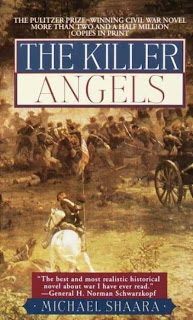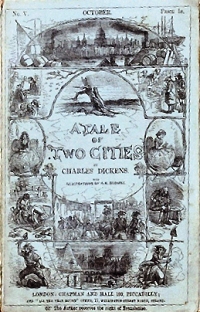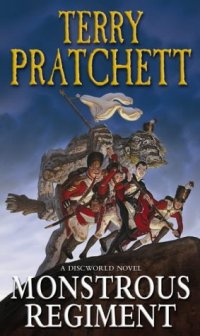Theater 2013-14: The few, the proud (actors) will fight and fight again in Lifeline war zones
 Sixth in a series of season previews: Combat and upheaval, both historical and way out of the box, start off with Civic War epic “The Killer Angels” and echo through battle fronts of two world premieres.
Sixth in a series of season previews: Combat and upheaval, both historical and way out of the box, start off with Civic War epic “The Killer Angels” and echo through battle fronts of two world premieres.
By Lawrence B. Johnson
Lifeline Theatre’s 2013-14 season, bannered as “War and Redemption,” will be played out on large canvases indeed – with opening salvos from the Civil War and the French Revolution. The season boasts two world premiere adaptations and a major component of staged tumult.
First up is a company reprise of “The Killer Angels,” adapted by Karen Tarjan from Michael Shaara’s novelized account of the crucial and deadly Civil War clash between a Confederate Army led by Robert E. Lee and a Northern force that narrowly holds on to prevail at a great cost of life.
Two world premiere adaptations follow: Charles Dickens’ “A Tale of Two Cities,” a story of personal sacrifice set during the French Revolution, and “Monstrous Regiment,” Terry Pratchett’s novel about a heroic lass in a fictional European country who goes off to war in hope of finding her older brother, who’s missing in action. The tale goes from bizarre to hilarious as our heroine strikes up comradeship with a vampire and a werewolf.
 Artistic director Dorothy Milne says history is on Lifeline’s side, and that once again her troupe of actors will provide man (and woman) power enough to soldier through the season’s wars and scourges.
Artistic director Dorothy Milne says history is on Lifeline’s side, and that once again her troupe of actors will provide man (and woman) power enough to soldier through the season’s wars and scourges.
“We do have our battles,” Milne says with a laugh. “We’re known for creating bigger battle scenes than we have actors to use. But we’re also clever at changing coats – actors running off-stage while fighting for one side and running back on wearing the other uniform.”
On a less belllicose note, Lifeline also will present its annual series of three musical plays for children, tales about talking ducks and pigs and a lonely crocodile named Lyle.
The 2013-14 season in brief:
 “The Killer Angels,” adapted by Karen Tarjan from the novel by Michael Shaara (Sept. 6-Oct. 27): Gettysburg, the summer of 1863, General Robert E. Lee has led the Army of Northern Virginia into the North, with the Army of the Potomac in pursuit. Over the course of three historic days, beside campfires and amidst firefights, soldiers wrestle with their doubts, their fears and their hopes for a shattered nation. Cemetery Hill, Culp’s Hill, Little Round Top, and Pickett’s charge are glimpsed through the stories of the men who fought the legendary battles. Shaara’s novel won the 1974 Pulitzer Prize for Fiction. “This is the 150th anniversary of the Battle of Gettysburg, and we thought it was timely to revisit this very human story of historical fiction,” says Milne. “It was a turning point in history, and throughout these days of battle, we get a fascinating look at the improv nature of war, how unpredictable the opposition is and how victory or defeat can turn on the tiniest points.”
“The Killer Angels,” adapted by Karen Tarjan from the novel by Michael Shaara (Sept. 6-Oct. 27): Gettysburg, the summer of 1863, General Robert E. Lee has led the Army of Northern Virginia into the North, with the Army of the Potomac in pursuit. Over the course of three historic days, beside campfires and amidst firefights, soldiers wrestle with their doubts, their fears and their hopes for a shattered nation. Cemetery Hill, Culp’s Hill, Little Round Top, and Pickett’s charge are glimpsed through the stories of the men who fought the legendary battles. Shaara’s novel won the 1974 Pulitzer Prize for Fiction. “This is the 150th anniversary of the Battle of Gettysburg, and we thought it was timely to revisit this very human story of historical fiction,” says Milne. “It was a turning point in history, and throughout these days of battle, we get a fascinating look at the improv nature of war, how unpredictable the opposition is and how victory or defeat can turn on the tiniest points.” “A Tale of Two Cities,” adapted by Christopher M. Walsh from the novel by Charles Dickens (world premiere adaptation, Feb. 14-April 6, 2014): As the Reign of Terror sweeps through Paris, destroying both the high-born and low, two Londoners are confronted with impossible choices. Will former aristocrat Charles Darnay abandon his family and enter the revolutionary storm to protect an innocent man? And can depressive barrister Sydney Carton find the strength to make the ultimate sacrifice for the unrequited love of his life? It is a tale social upheaval, moral self-examination and redemption in a churn of bloody revolution. “It’s one of the most famous and beloved novels ever written, and quite something to put on the stage,” says Milne. “While it fits our war theme, it’s essentially a story of young lovers and personal sacrifice, and people acting out of vengeance. It’s also a stunning look at the indiscriminate wrath and chaos that war brings. You can get ground under its wheels, and yet everyone wants to survive. It’s all still with us today – the war, the subterfuge, the possibility of getting caught up in something horrific through no fault of your own.”
“A Tale of Two Cities,” adapted by Christopher M. Walsh from the novel by Charles Dickens (world premiere adaptation, Feb. 14-April 6, 2014): As the Reign of Terror sweeps through Paris, destroying both the high-born and low, two Londoners are confronted with impossible choices. Will former aristocrat Charles Darnay abandon his family and enter the revolutionary storm to protect an innocent man? And can depressive barrister Sydney Carton find the strength to make the ultimate sacrifice for the unrequited love of his life? It is a tale social upheaval, moral self-examination and redemption in a churn of bloody revolution. “It’s one of the most famous and beloved novels ever written, and quite something to put on the stage,” says Milne. “While it fits our war theme, it’s essentially a story of young lovers and personal sacrifice, and people acting out of vengeance. It’s also a stunning look at the indiscriminate wrath and chaos that war brings. You can get ground under its wheels, and yet everyone wants to survive. It’s all still with us today – the war, the subterfuge, the possibility of getting caught up in something horrific through no fault of your own.” “Monstrous Regiment,” adapted by Chris Hainsworth from the novel by Terry Pratchett (world premiere adaptation, May 30-July 20, 2014): The fictional country of Borogravia is at war. When Polly Perks’ brother goes missing in action, she begins a personal search, which means gaining access to the battle front – which means cutting her hair, stuffing a sock down the front of her breeches, and enlisting. But Polly soon realizes that everyone in her squad is protecting a secret and that nothing in this improbable war is as it seems. Scrambling to survive both enemy assaults and the stupidity of an untried commander, her misfit company makes its way to the front, where revelations comes as fast and thick as bullets. It’s a comical take on the absurdities of war, to say nothing of the ambiguities of identity. “The army includes Frankenstein monsters and trolls and other colorful characters, and they’re all hiding something,” says Milne. “It’s all fantastical, and very funny, but it also says a lot about gender roles in the real world and what we perceive as appropriate for males and females – an issue that’s still relevant in our own society.”
“Monstrous Regiment,” adapted by Chris Hainsworth from the novel by Terry Pratchett (world premiere adaptation, May 30-July 20, 2014): The fictional country of Borogravia is at war. When Polly Perks’ brother goes missing in action, she begins a personal search, which means gaining access to the battle front – which means cutting her hair, stuffing a sock down the front of her breeches, and enlisting. But Polly soon realizes that everyone in her squad is protecting a secret and that nothing in this improbable war is as it seems. Scrambling to survive both enemy assaults and the stupidity of an untried commander, her misfit company makes its way to the front, where revelations comes as fast and thick as bullets. It’s a comical take on the absurdities of war, to say nothing of the ambiguities of identity. “The army includes Frankenstein monsters and trolls and other colorful characters, and they’re all hiding something,” says Milne. “It’s all fantastical, and very funny, but it also says a lot about gender roles in the real world and what we perceive as appropriate for males and females – an issue that’s still relevant in our own society.”
Kid Series Productions:
 “Clack, Clack, Boo! A Tricky Treat,” a new musical premiering in conjunction with the publication of the book by Doreen Cronin, illustrated by Betsy Lewin. Adapted by James E. Grote, Music and lyrics by George Howe (World Premiere, Oct. 19-Nov. 24): It’s Halloween! Duck, Pig, Cow and Hen can’t wait to throw a party, complete with apple-bobbing, bottomless candy bowls, and a spook-tacular costume contest. But when mean ol’ Farmer Brown refuses to allow the festivities, it’s going to take some clever trickery to enjoy the tasty treats. The barnyard crew sets out to teach Farmer Brown that sometimes a little scare can be big fun.
“Clack, Clack, Boo! A Tricky Treat,” a new musical premiering in conjunction with the publication of the book by Doreen Cronin, illustrated by Betsy Lewin. Adapted by James E. Grote, Music and lyrics by George Howe (World Premiere, Oct. 19-Nov. 24): It’s Halloween! Duck, Pig, Cow and Hen can’t wait to throw a party, complete with apple-bobbing, bottomless candy bowls, and a spook-tacular costume contest. But when mean ol’ Farmer Brown refuses to allow the festivities, it’s going to take some clever trickery to enjoy the tasty treats. The barnyard crew sets out to teach Farmer Brown that sometimes a little scare can be big fun.- “The True Story of the Three Little Pigs,” a musical based on the book by Jon Scieszka and Lane Smith. Adapted by Robert Kauzlaric, music by Paul Gilvary and William Rush (Jan. 11-Feb. 16, 2014): There are two sides to every story and the long-suppressed account of the Big, Bad Wolf is finally brought to light in Piggsylvania’s Trial of the Century. But can a lone wolf get a fair trial in a corrupt piggy court? And will anyone believe that all the “huffing and puffing” nonsense was just a cover-up for a simple story about a sneeze and a cup of sugar?
- “Lyle Finds His Mother,” a musical based on the book by Bernard Waber. Adapted by Jessica Wright Buha, music and lyrics by Michael James Brooks (World Premiere, March 22-April 27, 2014): Lyle the crocodile loves his life with the Primms in the house on East 88th Street. But everything changes when Hector P. Valenti, star of stage and screen, appears with an offer to take Lyle to meet his mother in the land of the crocodile. Should Lyle trust the devious showman? And will his adopted family understand his desire to meet his birth mother?
Getting there:
Lifeline Theatre is located at 6912 N. Glenwood Ave. Founded in 1982 by five graduates of Northwestern University, Lifeline moved into its permanent home in Rogers Park, a converted Commonwealth Edison substation, in 1985. The facility includes a 99-seat theater, rehearsal and office space, a scene shop, and costume, prop and scenery storage.
Related Links:
- Official website of Lifeline Theatre: LifelineTheatre.com
- Backgrounder on the battle of Gettysburg: Read it here
- Charles Dickens and “A Tale of Two Cities”: Read a critical appreciation here
- Review of China Miéville’s “The City & the City” at Lifeline: Read it at ChicagoOntheAisle.com
- Review of Alexandre Dumas’ “The Three Musketeers” at Lifeline: Read it at ChicagoOntheAisle.com
- Review of Wilkie Collins’ “The Woman in White” at Lifeline: Read it at ChicagoOntheAisle.com
Tags: A Tale of Two Cities, Bernard Waber, Betsy Lewin, Charles Dickens, Chris Hainsworth, Christopher M. Walsh, Doreen Cronin, Dorothy Milne, George Howe, James E. Grote, Jessica Wright Buha, Jon Scieszka, Karen Tarjan, Lane Smith, Lifeline Theatre, Michael James Brooks, Michael Shaara, Monstrous Regiment, Paul Gilvary, Robert Kauzlaric, Terry Prachett, The Killer Angels, William Rush

